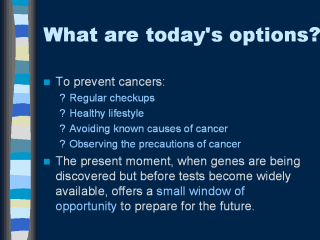 |
We already know a lot about cancer prevention and early detection, and we don't
need to wait for a gene test to put this information to good use. Regular
checkups by the doctor - including mammography, prostate exams, skin exams, or
Pap tests as appropriate - coupled with a healthy lifestyle are important for
everyone. So is avoiding known causes of cancer: cigarette smoke, too much
sunlight, unnecessary radiation. Persons who have a family history of cancer
should be especially conscientious about observing these precautions, and they
should make sure their doctor is aware of their family history. People with a
very strong family history - a number of close relatives who have had cancer,
especially if it occurred at a young age and in more than one generation - may
want to schedule more frequent checkups and begin them in their twenties or
thirties. Prophylactic surgery is an option, although persons considering it
should realize that it brings no guarantee that cancer won't occur. Another
option is to contact one of the research programs now getting under way.
It isn't necessary, though, for gene tests to arrive on the scene to give
serious thought to the idea. If a gene test were available, would you want to
have it? Would you want your family to be tested? What actions would you be
prepared to take? And what should society be doing about the issues of privacy
and discrimination? The present moment, when genes are being discovered but
before tests become widely available, offers a small window of opportunity to
prepare for the future. |
